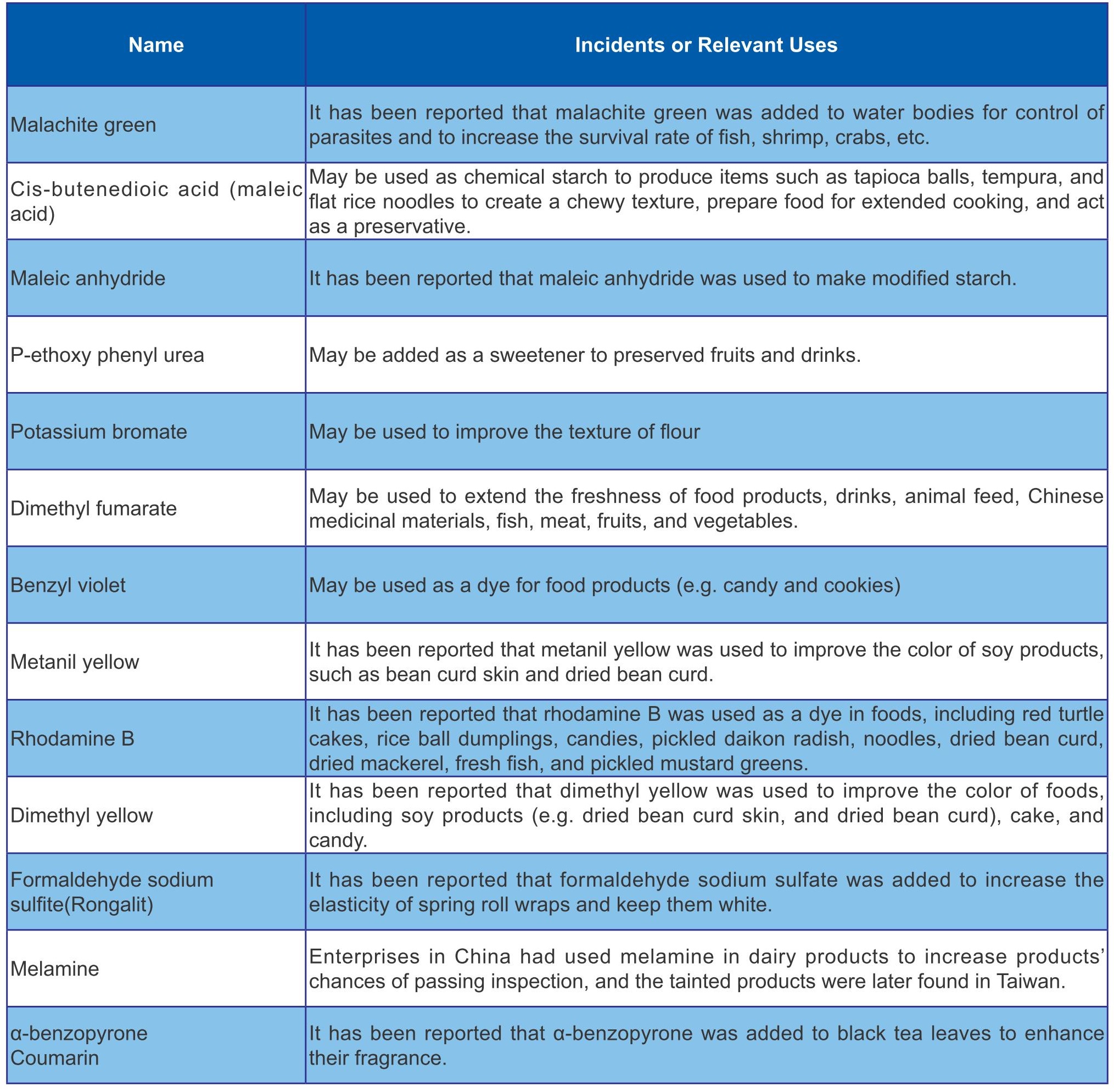- Date:2017-10-20
- Department:Chemicals Administration Ministry of Environment
To improve regulations on chemicals and reduce the risks of harmful substances in food, the EPA announced 13 chemicals, which are sometimes illegally added to food, as toxic chemical substances. Chemicals such as Rhodamine B, metanil yellow, rongalite, coumarin, and maleic acid have been involved in cases of food contamination, found in red sweet dumplings, dried tofu, wraps for spring rolls (run bing), black tea, and tapioca balls. These chemicals are all mentioned in this announcement.
The EPA indicated that the 13 chemical substances listed in the announcement are not legal food additives. Companies that illegally use such substances in food are doing so largely to cut costs and improve the appearance of their products. Companies add these chemicals to improve the texture of certain foods, change their color, add fragrance, extend shelf life, or obscure the results of quality inspections. For instance, metanil yellow is a chemical used in the leather and paint industry and is roughly half the price of yellow 4 and 5 used for food coloring. Metanil yellow also has stronger dyeing properties, and as such is used in dried tofu. The chemical Rhodamine B is often used in wax paper and paint. Though not cheap, it does not fade easily and therefore might be used to produce sweet dumplings. Malachite green, known for its carcinogenic properties, is to be further regulated as it is sometimes illegally used in waterbodies for pest and disease control and affects fish and crustaceans.
The EPA points out that companies that use any of these 13 chemical substances must first apply for approval beforehand, regardless of whether the chemicals are used in manufacturing, import, usage, or sale. The company must regularly report its operations and go through the application process mentioned above. This will allow the EPA to better grasp the flow of these chemicals. Companies are also required to have labels on all containers and packaging that read “CANNOT BE USED IN FOOD” in order to reduce accidental usage. Companies are also required to file their first report by 15 February, 2018, complete the labeling by 15 July 2018, and obtain the approval documents by 15 January 2019 in order to manufacture, import and sell such chemicals. Enterprises that do not comply will be fined NT$60,000~500,000 in accordance with the Toxic Chemical Substances Control Act.
To strengthen the management for chemicals with food safety concerns, the Toxic and Chemical Substances Bureau (TCSB) began conducting inspections of the chemical industry in February 2017. From May 2017, the TCSB has been conducting comprehensive inspections and has provided assistance to 2,196 enterprises. Beginning from “establishing a baseline information system,” the TCSB has promoted a form of management including inventory, questions, management, and reporting. It establishes partnerships with local governments and local chemical industry associations. To improve the basic understanding of chemical substances among private enterprises, this partnership allows all parties to carry out inspections and provides assistance concerning chemical substances which may pose risks to food safety.
In addition to the TCSB, local inspection participants include environmental and health departments. Joint investigation not only strengthens inter-departmental law enforcement mechanisms and exchanges of management experiences, but also further blocks chemicals for industrial use and other prohibited chemical substances from entering the food chain. As of 26 September 2017, a total of 1,518 investigations on industrial chemical enterprises had been completed.

Table: Thirteen newly announced toxic chemical substances (not announced as food additives by the Ministry of Health and Welfare)
Source: EPA Environmental Policy Monthly, p.4-5, Vol. XX, Issue 10, 2017



